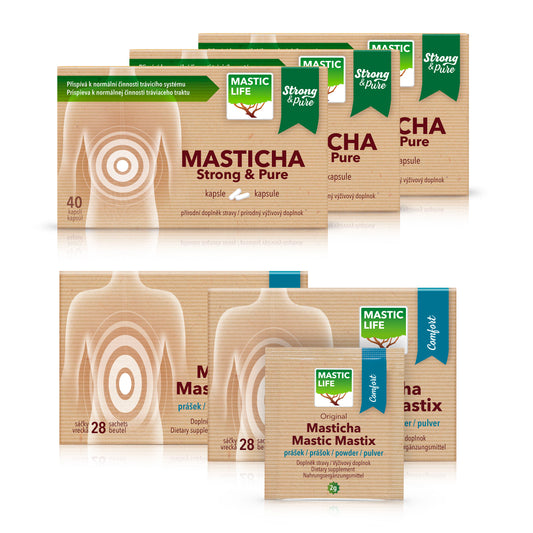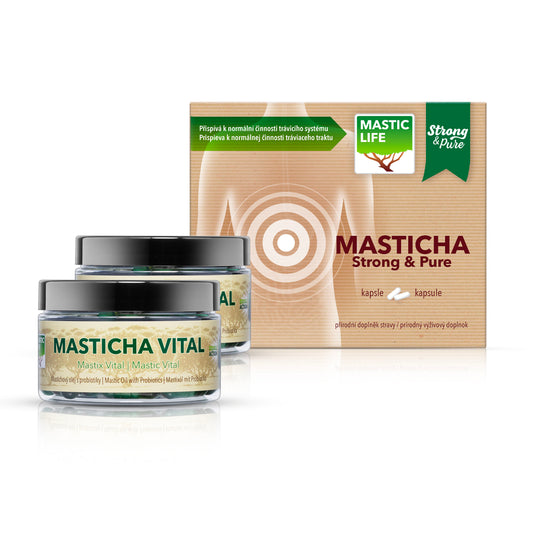Interview : Comment traiter la RGO (Régurgitation Gastro-Oesophagienne) du point de vue de la médecine fonctionnelle ?
Partager
- Auteure : Eva Hájková , MBA
- À propos de l'auteure : Eva est diplômée en protection de la santé publique de l'école de médecine de l'Open University et, pendant ses études, elle a effectué un stage au sein du NHS de Londres (Service national de santé) dans le dépistage des cancers du col de l'utérus, du sein et de la prostate.
Comment traiter le RGO du point de vue de la médecine fonctionnelle ?
Pourriez-vous m'expliquer ce qu'est la médecine fonctionnelle ?
La médecine fonctionnelle (MF) est un terme quelque peu malheureux pour moi, qui a été emprunté à l'anglais « Functional Medicine ».
Il faut plutôt la considérer comme une approche globale du patient, où le praticien en médecine familiale possède, entre autres, des connaissances dans le domaine :
- nutrition
- charges environnementales
- psychologie
- charge toxique
et peut donc considérer le patient de manière véritablement holistique.
La médecine fonctionnelle ne traite ni ne supprime les symptômes, mais s'attaque aux causes des problèmes de santé.
Les médecins et autres professionnels de santé consacrent donc logiquement beaucoup plus de temps au patient qu'à un médecin généraliste afin de comprendre l'ensemble de la situation et d'identifier les causes et les facteurs déclenchants possibles des problèmes de santé, qu'ils s'efforcent ensuite de réduire ou d'éliminer consciemment et systématiquement avec le patient. Pour ce faire, ils utilisent divers outils, tels que la chronologie ou la matrice.
La médecine fonctionnelle ne traite pas les affections aiguës, mais se concentre sur les maladies chroniques, que la médecine classique ne sait pas encore comment prendre en charge et qu'elle résout par des traitements médicamenteux à long terme, ce qui met l'organisme à rude épreuve, notamment ses mécanismes de détoxification.
La médecine fonctionnelle est un domaine totalement nouveau en République tchèque, qui, à mon avis, mérite une attention particulière. C'est pourquoi, avec mon collègue le Dr Jan Vojáček et Žaneta Kremsa, nous avons fondé l'Institut de médecine fonctionnelle et de nutrition, où, outre la clinique pour les clients, nous nous efforçons de proposer une formation professionnelle aux médecins, pharmaciens et nutritionnistes dans le domaine de la médecine fonctionnelle et de la nutrition.
Qu’est-ce que la maladie de reflux gastro-œsophagien (RGO) et comment est-elle prise en charge du point de vue de la médecine fonctionnelle ?
Le reflux gastro-œsophagien (RGO) est une affection fréquente qui altère considérablement la qualité de vie des personnes qui en souffrent. Il se caractérise par la remontée du contenu de l'estomac dans l'œsophage et peut provoquer divers symptômes, allant jusqu'à l'inflammation de la muqueuse œsophagienne. Selon la médecine conventionnelle, la cause du reflux gastro-œsophagien réside dans la rupture de la barrière anti-reflux, dont les principaux composants sont le sphincter inférieur de l'œsophage (SIO) et le diaphragme. Cette affection touche environ 20 à 25 % de la population mondiale et est souvent associée à l'âge avancé et au mode de vie (alimentation, activité physique, stress et exposition à des substances toxiques).
Symptômes
Les signes symptomatiques sont principalement :
- brûlures d'estomac (pyrosis)
- mauvaise haleine
- sensation de brûlure dans la gorge
- douleur derrière le sternum lors de la déglutition
- retour des sucs gastriques dans la bouche
- toux chronique
- enrouement ou constipation prolongée
Parmi les symptômes moins connus, on peut citer l'asthme, les caries dentaires et la gingivite .
La plupart des personnes souffrant de reflux prennent des médicaments qui suppriment la sécrétion d'acide gastrique, lesquels, bien qu'ils soulagent les symptômes désagréables, ne traitent pas la ou les causes sous-jacentes de cette affection.
Nous adoptons donc une approche plus holistique envers nos clients et essayons de déterminer la cause principale du reflux ou le dysfonctionnement du sphincter inférieur de l'œsophage, et comment améliorer son fonctionnement.
Les causes peuvent être multiples. Parmi les principales que nous rencontrons dans notre clinique figurent des sensibilités alimentaires spécifiques, souvent méconnues du patient, des carences en certains micronutriments, ainsi qu'un mode de vie malsain (stress excessif, consommation d'alcool, tabagisme). Ces facteurs déterminent les interventions que nous recommandons.
Recommandation
| Recommandations pour le RGO | Description |
|---|---|
| réduction de poids | Pour les clients en surpoids ou obèses, perdre du poids peut être très bénéfique. |
| Réguler l'acidité gastrique (HCl) | Chez les personnes âgées, l'acidité gastrique est souvent insuffisante ; le problème ne réside pas dans l'acide lui-même, mais dans le fonctionnement du sphincter inférieur de l'œsophage. Un faible taux d'acide chlorhydrique peut également favoriser la prolifération d'Helicobacter pylori. |
| Style de vie | Évitez le tabac, l'alcool et les repas tardifs. Faites analyser votre sang afin de détecter d'éventuelles carences en macro- et micronutriments pouvant affecter la fonction des neurotransmetteurs et le fonctionnement du sphincter œsophagien. |
| Régime | Évitez les aliments qui aggravent le reflux (caféine, chocolat, aliments épicés, aliments très acides, y compris les agrumes, et aliments gras). |
| Compléments alimentaires | Les enzymes digestives peuvent être utiles et nous avons d'excellents retours de nos clients sur la gomme mastic de Chios . |
Gomme mastic de Chios et reflux gastro-œsophagien (RGO)
La gomme mastic de Chios est en réalité une résine extraite de la tige et des branches latérales du Pistacia lentiscus var. Chia et constitue une recette grecque traditionnelle contre les brûlures d'estomac et l'halitose.
Les cristaux de gomme mastic sont généralement mâchés, libérant ainsi les principes actifs dans la bouche, l'œsophage et l'estomac.
Une autre solution consiste à utiliser des capsules de gomme de mastic , qui contiennent de la poudre de gomme de mastic pure et dont le principe actif pénètre dans l'estomac.
La gomme mastic de Chios est également utilisée comme ingrédient dans la cuisine méditerranéenne .
Sur le plan clinique, cette résine s'est avérée efficace, entre autres, dans le traitement des ulcères gastriques et duodénaux bénins. Il est clair que la maladie de reflux gastro-œsophagien nécessite une prise en charge globale et systématique.
De notre point de vue, l'utilisation prolongée de médicaments ne résout pas la cause de cette maladie, mais ne fait que supprimer les symptômes et les signaux d'alerte de notre corps.

FAQ : Comment traiter le RGO du point de vue de la médecine fonctionnelle ?
Qu'est-ce que la médecine fonctionnelle ?
La médecine fonctionnelle est une approche globale qui recherche les causes profondes des problèmes de santé en agissant sur des facteurs tels que la nutrition, l'environnement, l'exposition aux toxines et la psychologie. Elle se concentre principalement sur les affections chroniques plutôt que sur la simple suppression des symptômes.
Quelles sont les causes du RGO (reflux gastro-œsophagien) ?
Le reflux gastro-œsophagien (RGO) survient lorsque le contenu de l'estomac remonte dans l'œsophage, provoquant des brûlures d'estomac, une mauvaise haleine et des douleurs à la déglutition. Un facteur clé est le dysfonctionnement du sphincter inférieur de l'œsophage (SIO). L'alimentation, le stress, l'alcool et d'autres facteurs liés au mode de vie peuvent y contribuer.
Comment la gomme de mastic de Chios aide-t-elle à soulager le RGO ?
La gomme de mastic de Chios est traditionnellement utilisée contre les brûlures d'estomac et l'halitose. Elle agit en apaisant la muqueuse gastrique et en favorisant le bon fonctionnement du sphincter inférieur de l'œsophage. Elle peut être consommée sous forme de cristaux à mâcher ou de gélules.
Quels changements de mode de vie peuvent aider à gérer le RGO ?
La perte de poids (si nécessaire), l'arrêt du tabac et de l'alcool, l'évitement des repas tardifs et la réduction du stress peuvent tous contribuer à améliorer les symptômes. Un apport nutritionnel adéquat et la recherche de carences peuvent également favoriser le bon fonctionnement de l'œsophage.




